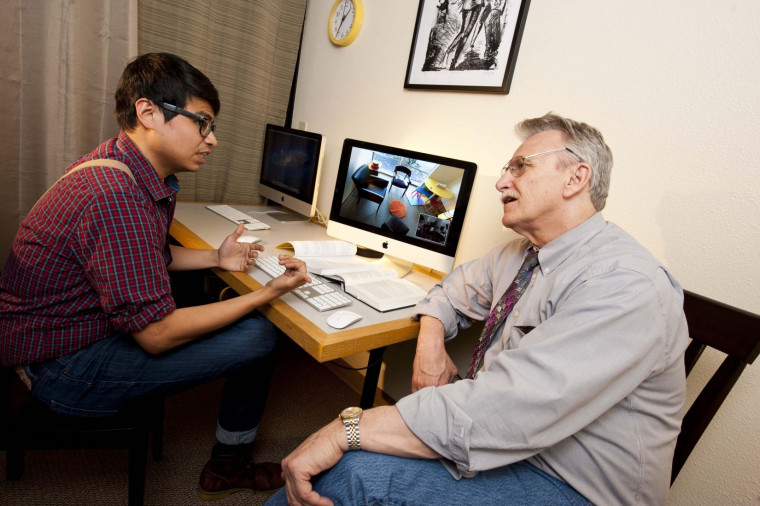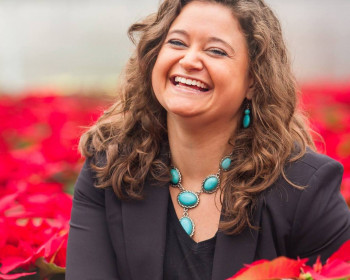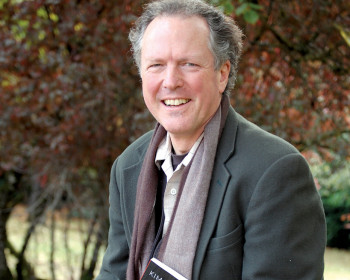Addiction and Mental Health
Open gallery

Early in his counseling career, Boyd Pidcock thought he understood the connection between addiction and homelessness. People drank and they took drugs—and feeding the addiction cost individuals their jobs, their marriages, and their families, until they became homeless.
Application deadline: February 1
“I thought clients would go to detox, get in-patient treatment, and all would be fine,” Pidcock remembers, shaking his head. Now, as director of Lewis & Clark’s Professional Mental Health Counseling—Addiction Program, Pidcock teaches a more realistic, and complex, understanding of addiction.
Experts in the field say Lewis & Clark’s program keeps abreast of new modes of treatment and new knowledge about the complex interplay of biology, psychological factors, and sociocultural processes contributing to addiction. Its graduates, they say, are prepared to work —and have an immediate impact—in the field.
The need for addictions counselors has never been greater. One American in 10 is addicted to drugs or alcohol, according to most studies. Addiction often goes hand-in- hand with domestic violence, child abuse, and crime. Families suffer. Meanwhile, community mental health agencies have seen their funding shrink while the demand for their services has grown. Lewis & Clark has sent dozens of interns into these programs, helping provide direct care and freeing up counselors to reach out to more clients. Many of those students have, in turn, been hired later by the agencies.
The Addiction Studies Program is based on an integrated model of understanding and treating addiction, recognizing that alcohol or drugs or gambling can be used as self-medication for deeper mental health issues, such as depression or posttraumatic stress disorder. The 10 to 15 students enrolled each year receive traditional mental health training and extensive education in understanding and treating addiction. Students are also encouraged to nourish their own sensitivity to important issues of family, culture, ethnicity, gender, and spirituality. After completing their master’s degrees, they are prepared to become statelicensed counselors as well as state-certified addiction counselors.
From 40 percent to 80 percent of people seeking treatment for addiction also have a mental health disorder, yet traditional treatment programs usually address only the addiction or the mental health issue, rarely both. A client might be sent to one clinic for addiction counseling and to another site for mental health counseling.
“At Lewis & Clark, we help our students recognize and treat mental health and addiction issues together,” Pidcock says. “An abundance of research consistently indicates that treating them separately neither supports what is best for the client nor results in an economically feasible solution—especially in these hard economic times.”
Pidcock worries as community addiction services try to do more with less. When a northeast Portland counseling center shut down in 2010 for lack of funding, leaving 500 clients without support, Pidcock and other professionals stepped in to reopen the facility as Russell Street Counseling Center. But, unable to raise enough money to run day-to-day operations, they were forced to close again after a few months.
“Recovery does work,” Pidcock says. “And it is cost-effective, even with severe, chronic disorders. We have many proven models for providing effective treatment. But do we have the resources and the will to provide treatment?”
Alumni Perspective: Joe Reisman, MA ‘02
Joe Reisman MA ’02 was one of the first students to complete Lewis & Clark’s Addiction Studies Program. A former television reporter, he had covered some of the biggest stories on the West Coast before making his dramatic career change.
Initially, Reisman was interested in family counseling.
“Boyd was the first person I went to see when I visited the grad school to learn about the counseling program,” Reisman says. “I wasn’t thinking that much about addictions counseling, but he made me realize how important it was. It’s an added strength to whatever I do. And as it turns out, it has dictated the road I’m on.”
Kaiser Permanente offered Reisman the opportunity to be the first intern in its addiction program, and he didn’t hesitate. “I was thrown in doing assessments, figuring out the computer system, working with kids and their parents,” he says. “Because of the addiction courses I’d taken, I felt prepared and ready to carve my own way. I had gotten a strong background.”
Now, as service director at LifeWorks Northwest, Reisman often hires interns from the Lewis & Clark program.
And it’s not because he’s an alum.
“The graduates I key in on are the ones coming out of Lewis & Clark with the background in addiction studies,” he says. “They’ve always been really well prepared.”
Lewis & Clark graduates are ready to work in the field because they are steeped in the newest science-based methods of treating addiction, says Wendy Hausotter, coordinator of public health and prevention for the State of Oregon’s problem gambling services. Those methods range from the trans-theoretical model of change, with its work toward developing strategies and processes to change, to dialectical behavioral therapy, which calls on Buddhist meditation techniques to build mindful awareness.
“Lewis & Clark puts a strong emphasis on making sure, through assessment and support, that its students come out with demonstrable skills,” she says. “They use evidence about what works in addiction treatment to inform their program.”
Graduate Communications is located in room 205 of Rogers Hall on the Graduate Campus.
voice 503-768-6054
fax 503-768-6053
Graduate Communications
Lewis & Clark
615 S. Palatine Hill Road
Portland OR 97219

